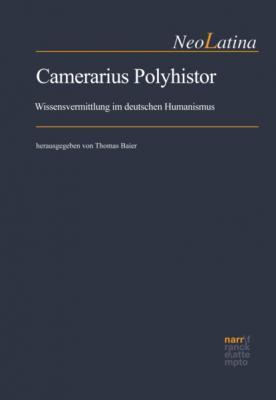ТОП просматриваемых книг сайта:
Camerarius Polyhistor. Группа авторов
Читать онлайн.Название Camerarius Polyhistor
Год выпуска 0
isbn 9783823300373
Автор произведения Группа авторов
Жанр Документальная литература
Серия NeoLatina
Издательство Bookwire
In school education Camerarius recommends that classical literature should be used as a warning example by which pupils can learn a proper method of translation. Just as many early Humanists despised the ad verbum method and execrated the version of Leontius PilatusPilato, Leonzio, a persistent strain in Humanism continued to look askance at versiones composed on the ad verbum principle. On their first printing in 1537, the versions of Divus had been immediately criticised by Camerarius, in the preface to his own explication of the first book of the IliadHomerIl., published in 1538, to which he appended a translation in Latin hexameters (Commentarius Explicationis primi libri Iliados HomeriCamerarius d.Ä., JoachimCommentarius explicationis primi libri Iliados Homeri, loachimi Camerarii […] Eiusdem libri primi Iliados conversio in Latinos versus, eodem auctore etc., Argentorati 1538). Even if the translator coins good Latin words, Camerarius disapproves of diverging from the laws of Latin syntax and grammar. The ad verbum versions corrupt both the matter and manner of the original as well as obscuring and degrading them and so should be avoided.18 Camerarius’ acumen enabled him to induce further discussion concerning the authorship of ancient poetry with the blend of poetry. For example, an examination of the Lament for Adonis’ linguistic and prosodic signals, as well as what might be called its conscious signals, provides ample evidence to uphold Joachim Camerarius’ original hypothesis of 1530 that Bion of SmyrnaBion von Smyrna authored the poem.19 After all, Camerarius exerted his wonderful erudition almost in every aspect of philological curriculum, from orthography20Camerarius d.Ä., JoachimDe orthographia to interpretation; the latter setting his major contribution to encompassing philology with Christian morality. Should the history of interpretation be envisioned as intellectual history, about the ways in which ancient texts were interpreted and discussed in Reformation Europe and under sober theological consideration or liberal theology, and the prominent role such ancient texts and the debates on them played in the intellectual history of Europe, Camerarius’ contribution could be conceived within this very frame of intimate personal scholarship. Therefore, we may ascribe the commentary method the Dutch Humanist and jurist Hugo GrotiusGrotius, HugoAnnotationes in Libros Evangeliorum (1583–1645) applied in his Annotationes in Libros Evangeliorum (Amsterdam 1641) to Camerarius’ Commentarius in Novum FoedusCamerarius d.Ä., JoachimCommentarius in Novum Foedus which was published at first in 1572, thus continuing FlaciusFlacius Illyricus, Matthias’ grammatical approach.21 In this work, Camerarius argued that the writings of the New Testament must be interpreted from the perspective of its authors and within the understanding of their world; otherwise, it would be impossible to grasp the meaning of the text as each New Testament writer intended it. By insisting on the knowledge of the context of the Biblical authors and not the opinions of early Church Fathers, as providing the key for interpreting the New Testament, Camerarius founded the historical-critical method22 to interpreting the Bible for modern Protestant commentaries.
His sense about textual sources as resources of interpretation drove him to write an influential commentary on the Theban plays of SophoclesSophokles (1534) as an introduction to his commentary on Oedipus TyrannusSophoklesO.T., reprinted in Henri EstienneEstienne, Henri’s 1568 edition and elsewhere, at a time when few readers in early modern Europe were able to read Sophocles in the original Greek. In a time when AristotleAristoteles’s PoeticsAristotelesPoet. were regarded either obscure or scarcely comprehensible, and fourteen years before Francesco RobortelloRobortello, Francesco’s commentary on Aristotle’s PoeticsAristotelesPoet. appeared (1548) – establishing AristotleAristoteles as authentia on that issue – and just before MelanchthonMelanchthon, Philipp’s Christianization of Greek tragedy through which Protestant Humanists marked a pivotal moment in the history of interpretation of Greek tragedy, Camerarius performed the Aristotelization of Sophoclean tragedy,23 in a way of conciliating AristotleAristoteles’s normative theory of tragedy in his PoeticsAristotelesPoet. and attempts to make sense of Sophoclean drama. Camerarius defines tragedy as a moral lesson, that is an imitation of momentous events entailing an unexpected and

